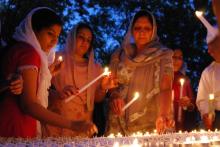Peace and Nonviolence

According to the Associated Press, over the past two days, in two separate strikes, U.S. drones killed 10 al-Qaida militants in Yemen.
The first attack late Monday hit two vehicles carrying seven passengers in the southern town of Radda, killing them all. Another U.S. drone targeted a second vehicle on Tuesday carrying three militants in the Zoukaika region of Hadramawt. One of the dead was identified as Abdullah Awad al-Masri, described as one of the "most dangerous elements" of al-Qaida in the militant stronghold of Bayda province and the man in charge of a bomb-making lab.

The Deseret News (Salt Lake City) published a thoughtful editorial this week raising some of the questions that need to be asked about drones. After citing the statistics on drone strikes and deaths over the last number of years, the editorial continues:
“This raises ethical questions about the way drones are changing modern warfare. As with nuclear weapons, which likewise changed war and its moral calculus, they prompt the question: Just because we can do something, does it mean we should?
Drones enable a warfare of focused assassinations. This strategy risks fewer American lives and is relatively easy to execute from a distance. But should risk and convenience drive the way we think about targeted killings? Do we have a clear sense of whether or when they cross a moral line? Who in our military hierarchy decides who lives and who dies, and what criteria do they use?
For a country that stands for the idea that justice should be decided fairly in courts of law rather than through contests of might, is there a line between justified killings and war crimes? How does our moral framework account for the hundreds of innocent civilians, including women and children, chalked up to collateral damage? …
The country may well come down on the side of drone strikes as a new keystone of national security. But it should do so as the result of a full discussion of the facts and a careful shaping of policies. This discussion has not yet happened. It needs to.”

The Association for Unmanned Vehicle Systems International is holding a convention this week in Las Vegas, with an expected 8,000 attendees, 500 exhibitors, and representatives from 40 countries. The Las Vegas Review-Journal columnist John L. Smith writes this morning that on Sunday, Franciscan Father Louis Vitale and CODEPINK co-founder Medea Benjamin were informed their attendance was not desired as they were attempting to secure convention credentials. Smith explains:
“For Vitale, who served in the Air Force before joining the Franciscans, the advanced technology hasn't translated into cleaner combat. The much-touted precision of the drone aircraft has kept American military out of harm's way, but it hasn't eliminated the high price of civilian casualties in the war zones.
To many, this is part of the price paid to defeat a treacherous enemy and maintain our national security. To Vitale, Benjamin and their colleagues, it's too great a price. And then he asks, "What is the impact on the people, what is the impact on our own people?"
The priest believes the incidents of predator operators suffering from post-traumatic stress disorder will be epidemic. His own experiences are anecdotal, he admits, but his conversations with British and U.S. military drone operators have been deeply troubling. Those onboard cameras not only spot suspected enemy targets, he notes, but they also reveal the damage wrought in unprecedented detail.”
From The Los Angeles Times:
Escalating violence in Syria has shut down pharmaceutical plants, piling another worry onto the woes facing the Syrian people: Severe shortages of medicine.
The World Health Organization warned Tuesday that growing clashes between forces loyal to President Bashar Assad and opposition fighters around the cities of Damascus, the capital, and Aleppo have damaged and closed many of the local plants that make the vast majority of medicines. The country produces most of its own pharmaceuticals.
Drugs to treat tuberculosis, hepatitis, diabetes and other maladies are urgently needed, along with chemical reagents to screen blood before it can be used for infusions for trauma and surgery patients, according to reports received by the United Nations agency.
Learn more here
Conor Friedersdorf writes for The Atlantic:
Since 9/11, many Americans have conflated terrorism with Muslims; and having done so, they've tolerated or supported counterterrorism policies safe in the presumption that people unlike them would bear their brunt. (If Mayor Bloomberg and the NYPD sent officers beyond the boundaries of New York City to secretly spy on evangelical Christian students or Israeli students or students who own handguns the national backlash would be swift, brutal, and decisive. The revelation of secret spying on Muslim American students was mostly defended or ignored.)
In the name of counterterrorism, many Americans have given their assent to indefinite detention, the criminalization of gifts to certain charities, the extrajudicial assassination of American citizens, and a sprawling, opaque homeland security bureaucracy; many have also advocated policies like torture or racial profiling that are not presently part of official anti-terror policy.
What if white Americans were as likely as Muslims to be victimized by those policies? What if the sprawling national security bureaucracy we've created starts directing attention not just to Muslims and their schools and charities, but to right-wing militias and left-wing environmental groups (or folks falsely accused of being in those groups because they seem like the sort who would be)?
Read more here

Like most people, I was deeply troubled by news of another mass shooting, this time at a Sikh temple in Oak Creek, Wis., not far from Milwaukee. On the heels of the tragic massacre in Aurora, Colo., this seemed all the more savage to me, given that it took place in a house of worship.
Maybe it’s because my wife and I work in a church and are aware of such vulnerabilities every day, but my first reaction is defensiveness. I want to raise my guard, double-check the locks and do whatever I can to ensure our safety. It’s the response that makes the most sense, after all.
Or is it?

Imagine the terror.
You are in a temple, a safe, sacred place, preparing for a morning service. In the kitchen, you are busy cooking food for lunch, while others read scriptures and recite prayers. Friends begin to gather for the soon-to-start service.
At the front door, you smile at the next man who enters. He does not smile back. Instead, he greets you with hateful stare and bullets from his gun.
Such was the scene Sunday at a Sikh gurudwara in Oak Creek, Wis., just south of Milwaukee, where a gunman, Wade Michael Page, killed six and critically injured three others before being shot down by law enforcement agents.
As Page began his shooting spree, terrified worshippers sought shelter in bathrooms and prayer rooms. Rumors of a hostage situation surfaced, and those trapped inside asked loved ones outside not to text or call their cell phones, for fear that the phone ring might give away their hiding place.
The first police officer to arrive on the scene stopped to tend to a victim outside the gurudwara. He looked up to find the shooter pointing his gun directly at him, and then took several bullets to his upper body. He waved the next set of officers into the temple, encouraging them to help others even as he bled.
That magnanimity is a common theme among the stories of victims and survivors of the Wisconsin shootings. Amidst terror and confusion, Sikhs offered food and water to the growing crowd of police and news reporters outside the gurudwara as part of langar — the Sikh practice of feeding all visitors to the house of worship.

The Long War Journal, citing AFP, reports that the first known U.S. drone strike in Yemen in more than a month took place Saturday:
“The U.S. killed five al Qaeda in the Arabian Peninsula fighters in a drone airstrike in eastern Yemen. The strike is the first in Yemen in more than a month.
The unmanned Predators or Reapers fired a pair of missiles at a vehicle in Al Qotn in Hadramout province earlier today, AFP reported. Five AQAP fighters were killed in the strike.
No senior AQAP leaders or operatives are reported to have been killed in the strike. The identities of those killed have not been disclosed.”

Sixty-seven years ago today, at 8:15 on the morning of August 6, 1945, it was a sunny morning in Hiroshima, Japan, a city of more than 300,000 people. Some were on their way to work, children were playing in the streets. Suddenly the sky exploded in a brilliant and hellish flash of light as a 15 kiloton nuclear bomb was dropped from a U.S. plane in the sky overhead. More than 70,000 people were instantly killed, some with their bodies etched into the pavement like eerie shadows. By the end of the year, as many as 140,000 had died, after five years, the toll was estimated as high as 200,000. Three days after Hiroshima, on August 9, 1945, a second nuclear bomb was used against Nagasaki, Japan. An estimated 75,000 people were killed in that explosion.
Today, according to the Associated Press, the annual ceremonies held in Hiroshima’s peace park to commemorate the bombing were attended by 50,000 people, including representatives from 70 countries. Two Americans with family ties to the bombings also attended.

I heard about the shooting at the Sikh temple in the middle of leading worship. It was the same space where two months ago we buried a child killed by gun violence. It was the same space where two weeks ago we prayed for the community of Aurora. And now we were gathered again and like the family of an addict we were left with the pain of a destructive lifestyle.
We wept. We prayed. We sang.
I stood up and said, “We have prayed. And there is power in prayer. Change can happen with prayers. And we pray for brothers and sisters who worship a different God than ours and yet we call them our family. We pray for the shooter because we are taught to pray for our enemies. But prayer is not enough."
Since Sunday's terrible shooting at a Sikh temple outside of Milwaukee, Wis., faith communities have been extending their support, thoughts, and prayers to the faith community.
As Christians, we are called to be a voice for peace and nonviolence — to stand against a culture of violence that has allowed for two such hateful acts in three weeks. We at Sojourners extend our deepest sympathis, our prayers lifted high, for all of those affected by the senseless tragedy.
Lamb of God,
you take away the sins of the world.
Have mercy on us.
Grant us peace.
For the unbearable toil of our sinful world,
we plead for remission.
For the terror of absence from our beloved,
we plead for your comfort.
For the scandalous presence of death in your creation,
we plead for resurrection.
Lamb of God,
you take away the sins of the world.
Have mercy on us.
Grant us peace.
Come, Holy Spirit, and heal all that is broken in our lives, in our streets, and in our world. In the name of the Father, and of the Son, and of the Holy Spirit. Amen.
— from Common Prayer
Please comment here to add your thoughts and prayers.
From The Washington Post:
If this small nation, with a per capita income of less than $3 a day and a life expectancy of 53, offers a hopeful model for fighting the scourge of AIDS in Africa, then large and relatively prosperous Uganda shows how quickly progress can run off track.
Secretary of State Hillary Rodham Clinton saw Malawi’s more promising example Sunday as part of an eight-nation African visit. Last week in Uganda, she highlighted an alarming rise in infection rates there after years when the country was a leader in preventing the spread of HIV and AIDS. About 23 million people in sub-Saharan Africa are believed infected, and the United Nations has estimated that the region had 1.2 million AIDS-related deaths in 2010.
Read more here

Eugene Robinson in The Washington Post takes a look at an emerging “drone culture.”
“There has been far too little discussion of the moral calculus involved in using flying robots as tools of assassination. At the very least, the whole thing should leave us uneasy. Collateral damage — the killing of innocents — can be minimized but not eliminated. And even if only “bad” people are killed, this isn’t war as we’ve traditionally understood it. Drone attacks are more like state-sponsored homicide.”
After also looking at proposals for the domestic use of surveillance drones, and urging a “much-needed debate,” he concludes,
“The idea of robots acting as guardians of public order has become a staple of dystopian fantasy — “Terminator,” “Minority Report,” “The Matrix.” It is our duty to keep that stuff in the movies, where it belongs.”

Using data from the Bureau of Investigative Journalism, the Guardian has created an interactive map of drone strikes in Pakistan, showing the location of known strikes. Each is marked with a red dot, clicking on it shows the date and number of casualties. According to the data, there have been more than 330 strikes, with estimates of up to 3,247 casualties — including up to 852 civilians. The map is a useful and educational tool.

Imagine a job where you sit in front of a computer monitor, toggling a joystick that controls a drone, watching a family 7,000 miles away in Afghanistan. You’re watching mothers and fathers with their children, children playing soccer; you watch them wake up in the morning, do their work, visit with their neighbors, and go to sleep at night.
Then one day when mom and the kids go off to market, the order comes to obliterate dad with a missile from high overhead. “Dad,” of course, is a “suspected militant,” which means he may or may not be a Taliban fighter, and that is all the justification needed to kill him.

The Bureau of Investigative Journalism has released its update for July of drone strikes and other US military and paramilitary actions in Yemen, Somalia and Pakistan. The major conclusions:
Pakistan: CIA drones kill more people in July than any month so far this year after Pakistan reopens its border to Nato supply convoys.
Yemen: The US restarts Yemen’s $112m military aid programme as al Qaeda appears to return to more familiar terror tactics.
Somalia: Three al Shabaab militants are executed for ‘spying’ for western agencies, as the UN claims that more than 60 unknown air sorties took place over Somalia in the past year.

HEY PRESIDENT OBAMA: The Nobel Peace Prize committee is calling. They want their medal back.
The coveted award, which many felt was premature, at best, when bestowed during the president’s first year in office, was seriously tarnished in the eyes of many by his escalation of the war in Afghanistan and other military endeavors.
But Obama’s role in waging drone warfare—particularly in Pakistan and Yemen—has made a mockery of the prize that Alfred Nobel said should go to the person “who shall have done the most or the best work for fraternity between nations.”
Obama’s drone attacks—according to a May investigation by The New York Times, Daniel Klaidman’s new book Kill or Capture, and other sources—are arguably in direct violation of U.S. and international law, and immoral to boot.
The drone attacks started out with clear rules: Only target those who represent a direct threat to the United States. Those rules soon went out the door—a senior U.S. official called it a “little liberalization that went on in the kill lists,” according to The Washington Post, while a former counterterrorism official said that “the elasticity of that has grown over time.”

IF YOU HAVE ever been to Jeju, you will understand why it is called a paradise. Lying in the waters south of the Korean mainland, this volcanic island is stunningly beautiful, from its clean mountain streams to its placid coral reefs. Jeju’s legendary female deep-sea divers harvest clams, abalone, and seaweed, relying on lung power alone. The island is also a spiritual place, said to be the body of Korea’s creation goddess, Mago. Jeju has been designated a UNESCO World Heritage Site and a World Biosphere Reserve.
Since January 2011, it’s also been the site where a $970 million naval base is being constructed by the South Korean government, with the help of giant construction corporations such as Samsung. The base, located in the small farming and fishing village of Gangjeong, will occupy a unique three-quarter-mile stretch of coastal wetland, threatening an ecological system that harbors several endangered species. The naval base construction also contributes to increasing military tensions in Asia, raising the risk of a devastating war in the region. Today, islanders, religious leaders, and peace activists are calling attention to dangers caused by joint U.S.-South Korean militarization.
The base is slated to be home to 20 warships, including submarines, aircraft carriers, and destroyers, several of them equipped with missile defense technology with the stated goal of protecting South Korea’s sea lanes and shielding against attack from North Korea. Civilian cruise liners will also be able to dock, according to the government. South Korean naval official Ku Okhyoe told a press conference last fall that U.S. military ships will be allowed to dock at the base only temporarily; Ku insisted, “The base is not intended for a certain country.”
On the PBS Moyers & Company, Bill Moyers recently interviewed Karl Marlantes, a highly-decorated Vietnam veteran, Rhodes Scholar, author, and PTSD survivor. Their deeply moving discussion focused on what happens to young soldiers in combat, the eventual trauma of having killed fellow human beings, and the assistance they need upon returning home.
"'Thou shalt not kill' is a tenet you just do not violate, and so all your young life, that's drilled into your head. And then suddenly, you're 18 or 19 and they're saying, ‘Go get ‘em and kill for your country.' And then you come back and it's like, ‘Well, thou shalt not kill' again. Believe me, that's a difficult thing to deal with," Marlantes tells Bill. "You take a young man and put him in the role of God, where he is asked to take a life - that's something no 19-year-old is able to handle." …
“The people that fight it are going to be fighting these battles, these spiritual, psychological battles most of their lives. And they need help. And I think that we have to be prepared as a nation that if we're going to commit a 19 year old to war, we're going to have to give him some help. And we're going to have to give his family some help. I mean, for every soldier with post-traumatic stress, there's a wife that is sitting there wondering what in the hell is happening to her husband. And why is this- what's going on here? She needs help and the kids need help.”
An interesting article from Glenn Greenwald examines how previously radical legislation has become accepted as normal in the U.S.:
Remember when, in the wake of the 9/11 attack, the Patriot Act was controversial, held up as the symbolic face of Bush/Cheney radicalism and widely lamented as a threat to core American liberties and restraints on federal surveillance and detention powers? Yet now, the Patriot Act is quietly renewed every four years by overwhelming majorities in both parties (despite substantial evidence of serious abuse), and almost nobody is bothered by it any longer. That’s how extremist powers become normalized: they just become such a fixture in our political culture that we are trained to take them for granted, to view the warped as normal.
Read more here